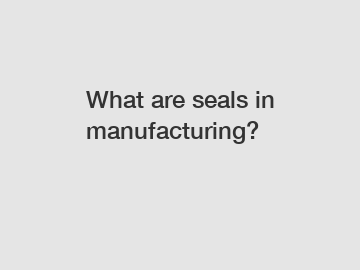Dec. 23, 2023
Automobiles
Understanding Seals in Manufacturing.
In the vast realm of manufacturing, seals play a crucial role in ensuring the efficiency and effectiveness of various applications. These seals, often taken for granted, are vital components that help to prevent leakage, contamination, and potential damage. In this article, we delve deeper into what seals are, their significance in manufacturing, and the different types available.
Types of Seals:

Seals can be broadly classified into two main categories - static seals and dynamic seals. .
Static Seals:
Static seals, as the name suggests, are used in applications where there is no relative motion between the mating surfaces. These seals are designed to prevent leakage of liquids or gases in static conditions. Typically, static seals are used in applications such as flanges, plumbing connections, and hydraulic systems.
Dynamic Seals:
Unlike static seals, dynamic seals are utilized in applications where there is relative motion between the mating surfaces. These seals are responsible for preventing leakage between moving components. Dynamic seals are common in applications such as piston seals, rod seals, and rotary shaft seals, where the prevention of fluid leakage is crucial to maintain the performance and longevity of the machinery.
Significance of Seals in Manufacturing:
Seals play a critical role in ensuring the smooth operation of manufacturing processes. They serve as barriers, preventing leaks that could lead to significant operational and financial losses. Seals also help to maintain the integrity of systems by preventing the intrusion of contaminants such as dust, dirt, and moisture. In industries such as pharmaceuticals, food processing, and aerospace, where the highest level of cleanliness is required, seals play an indispensable role in maintaining the quality and safety standards.
Furthermore, seals contribute to reducing maintenance and repair costs. By preventing leakage and system malfunctions, seals help to avoid unnecessary downtime and expensive repairs. A well-designed and properly installed seal can significantly prolong the lifespan of equipment and machinery, improving overall reliability and cost-effectiveness.
Types of Sealing Technologies:
Manufacturers employ various sealing technologies depending on the type of application and environmental conditions. Some common types of seals used in manufacturing include:
1. O-Rings:
O-rings are one of the most widely used sealing solutions due to their simple design and versatility. These circular rings, made of elastomers such as rubber, are placed in the interface between two mating surfaces, providing an effective seal against leakage.
2. Gaskets:
Gaskets are often used in static applications, particularly in flanged connections. These flat or molded rings, typically made of materials like rubber, metal, or composite materials, create a tight seal between two flat surfaces, preventing leakage.
3. Lip Seals:
Lip seals, commonly known as oil seals, are employed in rotating shaft applications to prevent the leakage of lubricants or the ingress of contaminants. These seals consist of a flexible lip that makes contact with the shaft, creating a barrier against leaks.
Conclusion:
Seals are indispensable components in manufacturing, ensuring the integrity and performance of various systems and equipment. Whether it's preventing leaks, minimizing contamination, or reducing maintenance costs, seals play a crucial role. By understanding the different types of seals and their applications, manufacturers can optimize their processes, minimize downtime, and enhance overall productivity.
If you are looking for high-quality seals or need assistance in selecting the right sealing solution for your manufacturing needs, please don't hesitate to contact us. We have a team of experts ready to provide personalized guidance and support.
Are you interested in learning more about mechanical seal oils, Rotary Shaft Industrial TC Oil Seal, Industrial Oil Seal Manufacturing Company? Contact us today to secure an expert consultation!
If you are interested in sending in a Guest Blogger Submission,welcome to write for us!
All Comments ( 0 )